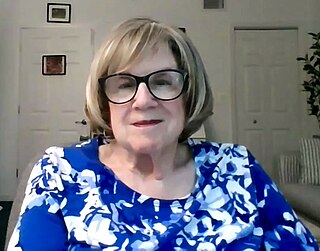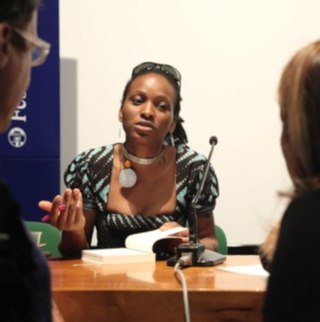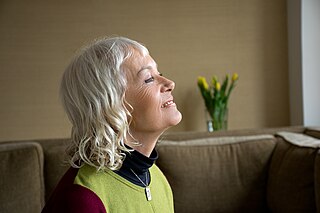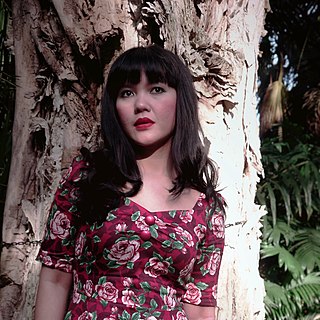Related Research Articles
Feminist science fiction is a subgenre of science fiction focused on such feminist themes as: gender inequality, sexuality, race, economics, reproduction, and environment. Feminist SF is political because of its tendency to critique the dominant culture. Some of the most notable feminist science fiction works have illustrated these themes using utopias to explore a society in which gender differences or gender power imbalances do not exist, or dystopias to explore worlds in which gender inequalities are intensified, thus asserting a need for feminist work to continue.
Science fiction and fantasy serve as important vehicles for feminist thought, particularly as bridges between theory and practice. No other genres so actively invite representations of the ultimate goals of feminism: worlds free of sexism, worlds in which women's contributions are recognized and valued, worlds that explore the diversity of women's desire and sexuality, and worlds that move beyond gender.
Jacques Heath Futrelle was an American journalist and mystery writer. He is best known for writing short detective stories featuring Professor Augustus S. F. X. Van Dusen, also known as "The Thinking Machine" for his use of logic. Futrelle died in the sinking of the RMS Titanic.

Dorothy Coade Hewett was an Australian playwright, poet and author. She wrote in a number of different literary styles: modernism, socialist realism, expressionism and avant garde. She was a member of the Australian Communist Party in the 1950s and 1960s, which informed her work during that period.

Elaine Showalter is an American literary critic, feminist, and writer on cultural and social issues. She influenced feminist literary criticism in the United States academia, developing the concept and practice of gynocritics, a term describing the study of "women as writers".

Nigerian literature may be roughly defined as the literary writing by citizens of the nation of Nigeria for Nigerian readers, addressing Nigerian issues. This encompasses writers in a number of languages, including not only English but Igbo, Urhobo, Yoruba, and in the northern part of the county Hausa and Nupe. More broadly, it includes British Nigerians, Nigerian Americans and other members of the African diaspora.
Sudanese literature consists of both oral as well as written works of fiction and nonfiction that were created during the cultural history of today's Republic of the Sudan. This includes the territory of what was once Anglo-Egyptian Sudan, the independent country's history since 1956 as well as its changing geographical scope in the 21st century.

Chika Nina Unigwe is a Nigerian-born Igbo author who writes in English and Dutch. In April 2014, she was selected for the Hay Festival's Africa39 list of 39 Sub-Saharan African writers aged under 40 with potential and talent to define future trends in African literature. Previously based in Belgium, she now lives in the United States.

Florence Nwanzuruahu Nkiru Nwapa, was a Nigerian author who has been called the mother of modern African Literature. She was the forerunner to a generation of African women writers, and the first African woman novelist to be published in the English language in Britain. She achieved international recognition with her first novel Efuru, published in 1966 by Heinemann Educational Books. While never considering herself a feminist, she was best known for recreating life and traditions from an Igbo woman's viewpoint.
The academic discipline of women's writing is a discrete area of literary studies which is based on the notion that the experience of women, historically, has been shaped by their sex, and so women writers by definition are a group worthy of separate study: "Their texts emerge from and intervene in conditions usually very different from those which produced most writing by men." It is not a question of the subject matter or political stance of a particular author, but of her sex, i.e. her position as a woman within the literary world.
Bilal Xhaferi, often referred to as Bilal Xhaferri, was an Albanian writer and political dissident against the Albanian communist regime. He is seen as the representative poet of the Albanian Chameria.

Feminist literature is fiction, nonfiction, drama, or poetry, which supports the feminist goals of defining, establishing, and defending equal civil, political, economic, and social rights for women. It often addresses the roles of women in society particularly as regarding status, privilege, and power – and generally portrays the consequences to women, men, families, communities, and societies as undesirable.
Uchechukwu Peter Umezurike, also known as Uche Peter Umez, is a Nigerian author and academic currently working as an assistant professor of English at the University of Calgary. In addition to publishing several works of children’s fiction, short fiction, and poetry, his academic research draws from gender studies and critical race theory to analyze African, African diaspora, postcolonial, and global literatures as well as film.
Barbara Ann Neely was an African-American novelist, short story writer and activist who wrote murder mysteries. Her first novel, Blanche on the Lam (1992), introduced the protagonist Blanche White, a middle-aged mother, domestic worker and amateur detective. The Mystery Writers of America named her their 2020 Grand Master winner.

Monika Zgustová is a Czech writer and translator. She is a key figure in the introduction of Czech literature in Spain, translating into Spanish and Catalan.
Charry Ada Onwu-Otuyelu is a Nigerian literature writer and the first female Director of Imo State Council for Arts and Culture. She is from Amaigbo in Imo State. She is a fiction writer of children's literature. She is an ex-soldier that worked with the Armed Forces medical service during the Biafran war. Her themes include folktales and history.
Akachi Adimora-Ezeigbo is a Nigerian author and educator, whose published work includes novels, poetry, short stories, books for children, essays and journalism. She is the winner of several awards in Nigeria, including the Nigeria Prize for Literature.

Intan Paramaditha is an Indonesian author and noted feminist academic. Her work has been described as focusing on "the intersection between gender and sexuality, culture and politics".
Juliana (Julie) Omonukpon Omoifo Okoh is a Nigerian playwright, educator and feminist activist who was professor of theatre theory at the University of Port Harcourt from 2004 to 2017. Dealing with issues concerning women in society, her plays include The Mannequins (1997), Edewede (2000) and Closed Doors (2007). She was a Fulbright Scholar and in 2011 she received a Lifetime Achievement Award from the Society of Nigerian Theatre Artists (SONTA)
Sophia Obiajulu Ogwude is a Nigerian Professor of English and Comparative Literature in the Faculty of Arts, University of Abuja, Gwagwalada.
References
- 1 2 3 4 Killam, G Douglas; Kerfoot, Alicia L (2008). Student Encyclopedia of African Literature. Bloomsbury Academic. pp. 220–221. ISBN 978-0313335808.
- ↑ Egejuru, Phanuel Akubueze (1993-01-01). "Nigerian Female Writers: A Critical Perspective". Callaloo. 16 (1): 275–277. doi:10.2307/2931832. JSTOR 2931832.
- ↑ MUHAMMAD ALKALI, ROSLI TALIF, WAN ROSELEZAM WAN YAHYA and JARIAH MOHD JAN (2014). "Liminality Space In-Between: A Feminist Evaluation of Primordial and Modern Polarities of the Woman's Journey in the Nigerian Novel". 3L:The Southeast Asian Journal of English Language Studies. 20 (1): 129–142. doi:10.17576/3L-2014-2001-10 – via The Southeast Asian Journal of English Language Studies.
{{cite journal}}: CS1 maint: multiple names: authors list (link) - ↑ "Nwakoby, Martina [WorldCat.org]". www.worldcat.org. Retrieved 2022-05-23.
- ↑ "Awele Nwakoby". www.amazon.com. Retrieved 2022-05-23.
- ↑ "Ten in the Family : Awele Nwakoby : 9780237500702". www.bookdepository.com. Retrieved 2022-05-23.
- ↑ "Results for 'Martina Nwakoby Nigeria' [WorldCat.org]". www.worldcat.org. Retrieved 2022-05-22.
- ↑ "3 results in SearchWorks catalog". searchworks.stanford.edu. Retrieved 2022-05-22.
- ↑ Ogunyemi, Chikwenye O. (1996). "Africa Wo/Man Palava: The Nigerian Novel By Women". University of Calgary Journal Hosting: 353 – via University of Calgary.